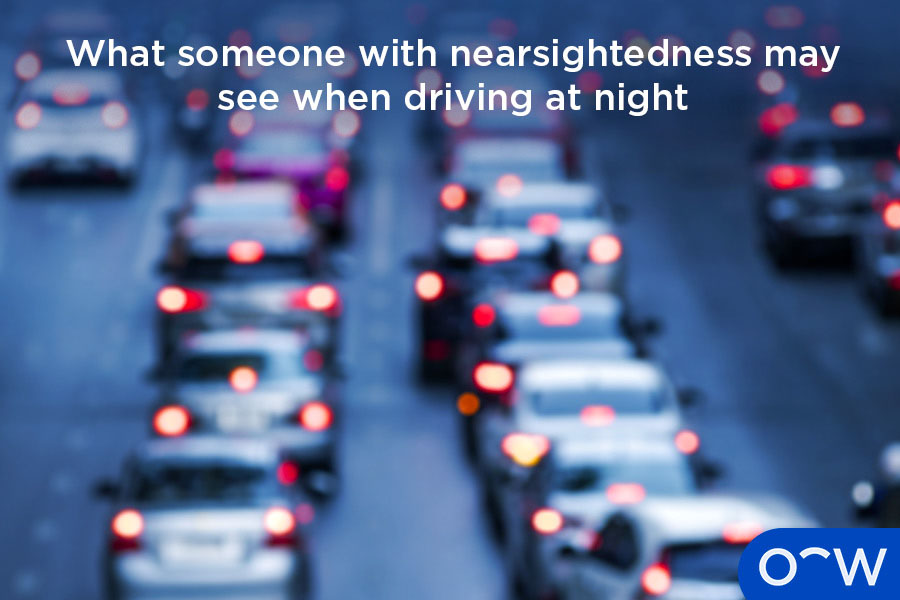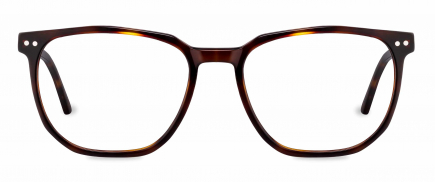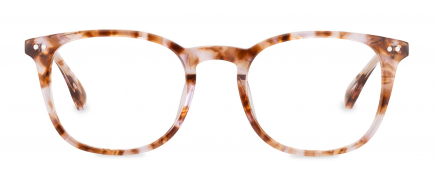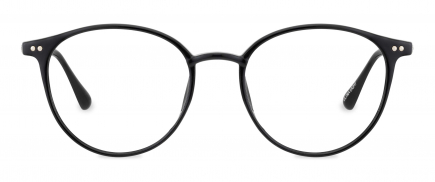Night Driving and Vision Glasses
Published on August 25th, 2023
Updated on September 2nd, 2025
 Australia
Australia Night driving glasses are glasses designed with lenses that often have a form of anti-reflective coating on them and can be prescription or non-prescription. Night driving glasses are intended for driving at night as they may help to block the reflection from the headlights of other vehicles and from streetlights. The main benefit of night driving glasses may be their assistance with protection against light reflection, preventing glare. A possible disadvantage of night driving glasses is that they may not be helpful in improving vision for those with eye conditions. It is commonly thought that yellow-tinted night driving glasses help improve visibility at night, however, they may not be effective. The anti-reflective coating on some night driving glasses is manufactured to prevent light reflection when driving at night through certain components in the lens material. This allows for even refraction of light, reducing reflection and enabling 99% more light to enter through the lens. Oscar Wylee does not offer glasses specifically for night driving but we do offer prescription or non-prescription glasses with an anti-reflective coating to help you see better at night and during the day.
What are the Best Night Driving Glasses?
The best night driving glasses are glasses that provide optimal vision and comfort when driving at night. At Oscar Wylee, we offer the option to add an anti-reflective lens coating to prescription and non-prescription glasses. Anti-reflective lenses are characterised as glasses designed with a particular coating that prevents light reflection from reaching the eyes and hindering vision. These can be a suitable option for when driving at night to reduce excessive light from the headlights of other vehicles and streetlights. These options may be suitable for helping provide more clarity and comfort when driving at night as anti-reflective lenses can hinder glare from obstructing vision. You can add on an anti-reflective coating at $50 per glasses frame at the lens add-on stage when ordering online.
How is the Night Vision Clarity of Night Driving Glasses?
The night vision clarity of night driving glasses may impede vision due to the yellow tint reducing light from reaching the eyes. Therefore, the clarity of night driving glasses depends on the type of lenses used. At Oscar Wylee, our anti-reflective coating may help with clearer vision at night. Night vision is defined as the ability to see in reduced-light conditions. Exposing the eyes to the dark prompts them to dilate in order to allow more light to enter. Our vision works at night through the rod cells in the eye's retina, which are responsible for enabling vision at night while the cone cells in the retina enable our colour vision during the day. Anti-reflective glasses may be helpful when driving at night as they are specifically for reducing excessive light reflected off headlights and streetlights.
How to Test Night Driving Glasses?
To test night driving glasses you can first book an eye test for night driving glasses, and ask an optometrist about driving glasses. You will then have an eye test performed by the optometrist. Discuss results with the optometrist who will confirm whether you may need night driving glasses. It is important to note, that Oscar Wylee does not offer specific night driving glasses but we do provide other lens options. The ways to test night driving glasses are listed below.
- Book an eye test for night-driving glasses: Book an eye test with an optometrist to access professional eye care and assistance with seeing if you require night-driving glasses.
- Ask an optometrist about driving glasses: Ask an optometrist about driving glasses if you may be experiencing poor vision during night driving, Oscar Wylee optometrists are available in-store to help with night vision issues.
- Have an eye test: Have an eye test performed by an optometrist, which can involve a visual acuity test, a refraction test, a visual field test, a dilated eye exam and tonometry.
- Discuss results with the optometrist: Discuss results with the optometrist who will assess your vision and confirm if you need night driving glasses or if your poor night vision may be caused by an underlying condition. You may require prescription glasses or a new prescription to help correct poor night vision. However, if your optometrist identifies signs of a more serious condition, you may be referred to an ophthalmologist.
To test night driving glasses, you will need to book an appointment for an eye test and to speak with an optometrist, you can receive professional advice and assistance with testing for night driving glasses. They will be able to discuss your results further with you and confirm if night driving glasses are appropriate or if your poor night vision may be caused by an underlying condition.
What Type of Lenses do Night Driving Glasses Have?
The type of lenses night driving glasses have are anti-reflective coated, non-prescription lenses and may include yellow-tinted lenses. Night driving glasses often use an anti-reflective coated type of lens as it is a form of protection that aids in preventing glare from obstructing your vision. Night driving glasses are typically non-prescription, however, at Oscar Wylee we do offer the option to add an anti-reflective coating to prescription and non-prescription glasses.
How do Yellow Lenses Help Improve Night Vision for Drivers?
Yellow lenses can help improve night vision for drivers, however, studies are mixed regarding their true effectiveness. They are designed to reduce glare and can enhance contrast by making objects appear clearer in low-light situations such as night driving and through more trickier conditions such as foggy roads or rain, though their effectiveness will differ for every wearer.
Do Night Driving Glasses Have Polarised Lenses?
No, Night driving glasses do not typically include polarised lenses as these are not suitable for low-light conditions. Polarised lenses are designed for the purpose of blocking out glare and excessive light during sunny and bright conditions when spending time outdoors.
What are Night Driving Glasses?
Night driving glasses are defined as glasses made to help those who may not have clear vision when driving at night. Night driving glasses may not be recommended or offer protection for those with glaucoma, cataracts and astigmatism as it may be more suitable to continue wearing your prescribed glasses. However, wearing anti-reflective lenses may improve visibility when there may be a lot of traffic during the night. Night blindness also known as nyctalopia, is characterised as the difficulty in seeing during night or reduced-light conditions. Night blindness may be a symptom of an issue in the retina according to Cleveland Clinic. There are many possible causes of night blindness. These can include myopia (nearsightedness), cataracts, glaucoma, deficiency in vitamin A, pupillary dilatation impairment and abnormal transmission of light through the lens according to the National Library of Medicine. An optometrist can help determine what may be causing the symptom through a comprehensive eye test. It is essential to see your optometrist if you are struggling to see clearly in dimmed-light conditions and at night.


Should you Wear Polarised Driving Glasses at Night?
You shouldn't wear polarised driving glasses at night. This is because polarised glasses are designed to reduce glare by blocking horizontal light waves, which give off excessive light reflection. This is beneficial during the day, but can impede vision at night.
How Do Night Driving Glasses Help for Night Vision?
Night driving glasses are proposed to help night vision through their anti-reflective lens. This may result in alleviating eye strain and fatigue according to Safe Style Eyewear. You may also try taking steps such as cleaning your windshield regularly and making sure your headlights are functioning correctly to ensure clear vision when driving at night. It is advisable to speak with your optometrist if you are experiencing poor visibility while driving at night.
Are Night Driving Glasses "Non-prescription Glasses"?
Yes, night driving glasses can be non-prescription glasses, meaning you do not require a prescription to wear night driving glasses. Although Oscar Wylee does not offer night driving glasses, we do provide a range of lens options for both prescription and non-prescription glasses for different visual and lifestyle needs. Our range of lenses that are available for either non-prescription or prescription includes high-index lenses, photochromic lenses, tinted lenses, multifocal lenses, anti-reflective lenses and hard coating and scratch-resistant lenses. Our anti-reflective lenses may be the most suitable option for driving at night as they may be helpful in cutting glare from headlights.
Do Night Vision Glasses Provide Ultraviolet Light Protection?
Yes, night vision glasses may be capable of providing ultraviolet protection as anti-reflection lenses can prevent a certain amount of harmful light rays from reaching the eyes. Therefore, most night-driving glasses may be effective for ultraviolet light protection.
What are the Key Features of Night Vision Driving Glasses?
The key features of night vision driving glasses are their anti-glare coating and yellow-tinted lenses. An anti-glare coating helps minimise impeding light sources, such as oncoming headlights and glare from the road, for better visibility. Many night vision driving glasses have a yellow tint, which is often said to reduce blue light and increase visual contrast in lower light situations for better clarity.
What are the Benefits of Night Driving Glasses?
The benefits of night driving glasses may include protection against glare which can enhance overall visibility and comfort while driving. The protection against glare can aid with ensuring there are no obstructions to your vision while driving at night and may also prevent any eye strain that may occur from overly bright lights.
How do Night Driving and Vision Glasses Affect Eye Health?
Night driving may affect your eye health if you are driving for long periods of time as your eyes are exposed to darkness and limited lighting available. This may result in your eyes overexerting effort to see at night and may lead to eye strain and fatigue according to the Florida Eye Specialists. If you're experiencing changes to your vision such as difficulty seeing clearly while driving at night, it may be necessary to see your optometrist. It is advisable to get your eyes regularly tested to ensure optimal eye health. If you require prescription glasses, regular eye tests can help ensure your glasses meet your visual needs.


Can you Get Prescription Night Driving Glasses?
Yes, you can get prescription night driving glasses. At Oscar Wylee, we sell prescription glasses with the option of adding an anti-glare filter. This ensures visual sharpness as well as a reduction of glare from elements on the road at night, such as oncoming headlights and road glare. However, it is up to the wearer to decide whether prescription night glasses are necessary for them based on their eyesight capabilities. You may want to consult an optometrist to see if prescription night driving glasses are best for you.
How do Night Driving Glasses Decrease Glare?
Night driving glasses may decrease glare if they include an anti-reflective coating on the lens. An anti-reflective coating on night driving glasses may help with reducing glare from other vehicles' headlights and streetlights due to the components of the lens material. The material of anti-reflective lenses essentially enables more light to enter through and helps to even out light refraction, resulting in less reflection of light. It may be beneficial to use anti-reflective glasses for night driving as they can be effective in preventing glare from obstructing vision.
How do Night Driving Glasses Help with Night Blindness?
Night-driving glasses may not help with night blindness as the right treatment depends on the cause of this symptom. Night blindness can make it difficult to see clearly at night or in low-light conditions. Night blindness also known as nyctalopia, can develop as a result of myopia, cataracts, glaucoma and vitamin A deficiency. Night blindness treatment can include prescription glasses, altering medication for glaucoma or surgery may be required if the night blindness is a result of cataracts according to the Cleveland Clinic.
Are Night Driving Glasses and Anti-glare Glasses the Same?
No, Night driving glasses and anti-glare glasses are not the same as they are two different types of lenses. Some night driving glasses are yellow-tinted and typically use an anti-glare coating in order to impede glare effectively.
Can Night Driving Glasses Be Used for Both Day and Night Driving?
Yes, night driving glasses can be used for both day and night driving. However, they are specifically designed for reducing glare and maximising visibility during night conditions where there is less amount of light, making them more suited to night driving.
Can Night Vision Glasses for Driving Help with Headlight Glare?
Yes, night vision glasses for driving can help with headlight glare. This is because night vision glasses include an anti-glare lens which reduces excess glare and light, such as from headlights, though not completely.
What are the Disadvantages of Night Driving Glasses?
The disadvantage of night driving glasses is that they may be ineffective in improving night vision for people with certain eye conditions. Night driving glasses may not be helpful for those with eye conditions such as cataracts, glaucoma and refractive errors as they are mainly intended to reduce glare from impeding vision.
What does Research Say About Night Driving Glasses?
The research for night driving glasses says they are unhelpful for those with eye conditions as night driving glasses may not improve visual acuity, may have adverse effects and the yellow-tinted lenses may not improve object detection however, their anti-reflective coating can be beneficial for night driving. The research for night driving glasses is listed below.
- Night Driving Glasses May Not Improve Visual Acuity: Night driving glasses may not improve visual acuity according to research by the Vision Centre. Therefore night driving glasses may not be suitable for those who require prescription glasses.
- Night Driving Glasses May Have Adverse Effects: Night driving glasses may have adverse effects on vision as the yellow tint on the lenses can lessen the amount of light from reaching the eyes according to Vision Centre.
- Yellow-tinted Lenses May Not Improve Object Detection: Yellow-tinted lenses did not help improve test subjects' ability to identify pedestrians better during night, according to the Review of Optometry. This was also supported in a study conducted by the Schepens Eye Research Institute, where yellow lens night-driving glasses did not appear to improve pedestrian detection at night in a sample size of 22 participants.
- Anti-reflective Lens Coating Can be Beneficial: Anti-reflective coating can be beneficial for night driving as they are proven effective for reducing headlight and streetlight glare according to a study published in the National Library of Medicine.
The general consensus towards night driving glasses is that they are not advisable to use for those with certain eye conditions unless discussed with an optometrist. However, with their anti-reflective coating, night driving glasses can be effective for some people in preventing glare from disrupting safe night driving.
Who Should Use Night Driving Glasses?
People who should use night driving glasses may be people with night blindness, people who still struggle to see clearly at night, frequent night-time drivers and older drivers. It is important to speak with your optometrist first as you need to follow the treatment as advised based on your condition. Oscar Wylee does not offer glasses specifically for night driving, however, our team will strive to ensure all your visual needs are met. The people who may need to use night driving glasses are listed below.
- People With Night Blindness: People with night blindness may experience difficulty seeing at night as a result of an underlying ocular issue. It is important to note, night driving glasses may not be capable of correcting night blindness. It is recommended that you speak with your doctor or optometrist first.
- People Who Struggle to See Clearly at Night: People who struggle to see clearly at night may or may not have an underlying vision condition. Night driving glasses may not likely aid this issue, however, you can ensure your headlights are fully functional, your windshield is clear and your glasses prescription is all updated.
- Frequent Night-time Drivers: Frequent night-time drivers including those who drive in their commute or delivery workers may opt for night driving glasses as they're more frequently exposed to low-light conditions and may potentially experience eye fatigue.
- Older Drivers: Older drivers may choose to wear night driving glasses as vision can decline with increased age likely making older drivers vulnerable to having poor night vision.
Why do Drivers with Nearsightedness Need Night Driving Glasses?
Drivers with nearsightedness may need night driving glasses as they are not capable of seeing objects in the distance which may be exacerbated in low-light conditions. It may be more suitable to wear your prescription glasses with an anti-reflective coating when driving at night to ensure optimal vision. If you are experiencing a change in your vision during night-time, you should speak with an optometrist so they can check for any signs of an eye condition. Nearsightedness also known as myopia is a refractive error and can occur as a result of an abnormal cornea shape or when the cornea grows excessively long from the front to the back according to the National Eye Institute.


Why do Drivers With Farsightedness Need Night Driving Glasses?
Drivers with farsightedness may need night driving glasses as they may have issues focusing on objects in the distance which may likely worsen in reduced-light conditions. Farsightedness (hyperopia) is also categorised as a refractive error. The causes may be related to the eyeball being too short from the retina to the cornea or an unusual cornea shape. It is strongly recommended to continue wearing your prescription glasses when driving at night. If you're noticing changes to your vision, it may be necessary to have an optometrist update your prescription.
Why do Drivers with Astigmatism Need Night Driving Glasses?
Drivers with astigmatism may need night driving glasses as it can cause blurry near and distance vision which may prompt the need for night driving glasses, as vision issues may be worse at night. To ensure clear vision while driving at night, it is strongly recommended to use your prescription glasses. Astigmatism may develop due to a curved shape issue with the cornea or lens of the eye and affects how light rays bend correctly when entering through the eye, resulting in the blurry appearance of objects. Blurriness caused by astigmatism can range from mild to severe and can be alleviated with the right prescription.
What are the Parts of Night Driving Glasses?
The parts of night driving glasses include a frame, temples, bridge and an anti-reflective lens. There are many different parts of eyeglasses. The parts of night driving glasses are listed below.
- Frame: The frame is the structure of the glasses and surrounds the other parts of the glasses. The frame of night driving glasses like all glasses can be made from plastic, acetate or metal.
- Temples: Temples are essentially the arms of the frames and help to ensure the glasses fit securely on your ears. Like other regular glasses, night driving glasses' temples are typically made using plastic or metal.
- Bridge: The Bridge on night driving glasses is essential in helping the glasses fit different face types properly and can differ between individuals.
- Anti-reflective Lens: The anti-reflective lens coating on night driving glasses is included to help reduce headlight glare from oncoming vehicles and streetlights.
Do Night Driving Glasses Have Anti-glare Coating?
Yes, night driving glasses typically include an anti-glare coating, also known as anti-reflective, to assist with preventing glare. Glare during the night can come from streetlights and from the headlights of oncoming vehicles. At Oscar Wylee we offer a range of lens options to suit your visual needs and lifestyle including anti-reflective lenses.
Do Night Driving Glasses Work?
Whether night driving glasses work can vary from wearer. Night driving glasses can reduce excess glare in night driving conditions, which can allow for better visual clarity at night. However, some may find they are not more effective than regular prescription glasses in navigating roads at night, and studies have not been able to fully verify their effectiveness.
How do Night Glasses for Driving Reduce Night Blindness Symptoms?
Night glasses can allow for better vision during night driving, however, they should not be a sole solution for reducing night blindness symptoms. Night blindness, also known as nyctalopia, is when someone has trouble seeing in dim or dark settings, according to the Cleveland Clinic. You should not be driving at night if you start to notice you have trouble seeing in dark places, as it can be dangerous for yourself or others. Consult an eye care professional immediately if you start experiencing night blindness.
Are Night Driving Glasses Essential for Drivers with Astigmatism?
Night driving glasses can be essential for drivers with astigmatism. Astigmatism is an eye condition where the cornea or lens in your eye is not perfectly curved, which can lead to trouble focusing, blurred vision, headaches or eye strain, according to Health Direct Australia.
Are There Any Risks or Disadvantages to Wearing Night Driving Glasses?
There can be disadvantages to wearing night driving glasses, such as potential ineffectiveness and colour distortion. Studies are inconclusive and divided when it comes to how effective night driving glasses are. They might not be worth the added cost and may not be more effective than regular prescription glasses when it comes to navigating the roads at night. Colour distortion may also be a disadvantage of wearing night driving glasses. Night driving glasses often come in yellow lenses, which reduce overall visible light to a degree, since they also filter some blue light according to All About Vision. This can be detrimental in very dark conditions, such as long roads with minimal headlights.
Read Night Driving and Vision Glasses in other Oscar Wylee regions and their languages.
 Australia
Australia







